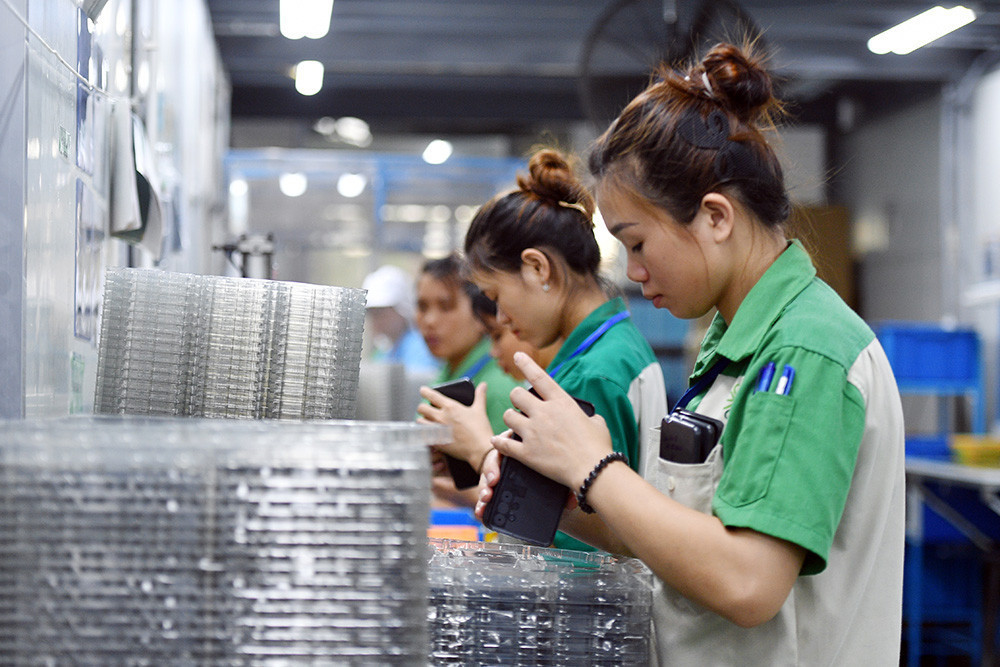
In the last days of 2022, Samsung Vietnam’s workers hurried to prepare for a big event that marked a new milestone in its 14-year history of operation in Vietnam – the inauguration of an R&D (research and development) center located in the West West Lake area in Hanoi.
Its initial investment in Vietnam in 2008 was for a $670 million mobile phone device manufacturing factory in Bac Ninh. The South Korean conglomerate is now the biggest foreign investor in Vietnam with six factories in three hi-tech complexes in Bac Ninh, Thai Nguyen and HCM City.
The inauguration of Southeast Asia's largest R&D center on November 23 is expected to be Samsung’s strategic R&D global base.
Besides Samsung, Vietnam in recent years has emerged as a production base for many technology and electronics groups such as LG, Foxconn and Apple’s vendors.
The Financial Times' recent analysis on the strategy of diversifying Apple’s supply chain noted that Vietnam has great advantages.
JPMorgan estimates that Vietnam will be able to manufacture a large quantity of Airpods, 20 percent of iPads and Apple Watches, and 5 percent of Macbooks by 2025.
However, the analysis warned of problems Vietnam may face when becoming a global manufacturing base for large technology groups.
It quoted a Microsoft’s former managing executive as saying that manufacturers face difficulties seeking component suppliers, because all second- and third-class vendors are in China.
As a result, they will have to import semi-finished products from China to Vietnam for assembly.
This is the major disadvantage of production in Vietnam, which explains why Vietnam’s FDI attraction strategy still has not obtained the desired effects.
Weak supporting industries, fragmented production, and the lack of SME (small and medium enteprises) vendors for foreign companies all make Vietnam less competitive. Poor infrastructure and logistics conditions are also bottlenecks.
That is why Vietnam can only attract foreign investors who want to do assembly, use the cheap labor force and enjoy investment incentives.
In its reports, the Ministry of Planning and Investment (MPI) has often admitted the problems in FDI attraction, including low spillover effects to the domestic sector, the low ratio of implemented investment capital to registered capital, and transfer pricing which helps foreign invested enterprises (FIEs) evade tax.
Reports from 2019 to now show that FIEs continue to report losses. According to the Finance Ministry, in 2019, only 45 percent of FIEs reported profits, while the remaining reported losses.
In 2020, 14,108 out of 25,171 enterprises, or 56 percent of enterprises that submitted reports, reported losses, totaling VND151.064 trillion.
MPI has suggested assessing FDI effects with 36 criteria, including 25 economic, seven social, and four environmental criteria.
Time to change
On January 12, 2023, MPI sent a dispatch to local authorities, requesting cooperation to review the last 35 years of attracting and managing FDI.
The review needs to take into account serious changes in foreign investment policy on a global scale such as the proposed global minimum corporate tax.
On October 8, 2021, the Base Erosion and Profit Shifting (BEPS), of which Vietnam is a member, issued a statement on the two-pillar framework to address challenges arising from the digital economy with the consensus of 136 member countries.
Of these, Pillar 2, which sets a global minimum corporate tax rate (15 percent), is expected to be applied from 2023.
The tax policy was designed to prevent a ‘race to the bottom’ in preferential tax rates among countries.
Vietnam will bear considerable impact from this policy.
With the new policy, Vietnam will have to ensure a corporate tax rate of 15 percent or higher.
According to the General Department of Taxation (GDT), of 36,500 FDI projects in Vietnam, 3 percent of projects or enterprises enjoy tax incentives, most of which are located in Industrial Zones (IZs) and Export Processing Zones (EPZs0.
As such, the 15 percent minimum tax policy targets 3 percent of projects now enjoying tax incentives in Vietnam.
The most common corporate income tax rate in Vietnam is 20 percent, but the actual tax rate for FIEs is just 12.3 percent, and large foreign corporations enjoy tax rates of 2.75-5.95 percent (many large FIEs bear a preferential tax rate of 10 percent for the entire life of their projects, enjoy tax exemption for four years, and a 50 percent reduction for the next nine years).
Vietnam will fall into a difficult situation: it needs to raise the minimum tax rate to 15 percent but retain and attract FDI Vietnam.
The solutions will be improving the investment environment, upgrading infrastructure, developing supporting industries, and improving the labor force.
Luong Bang